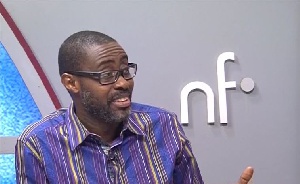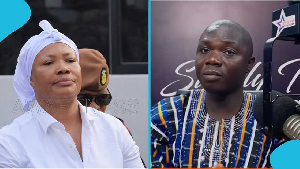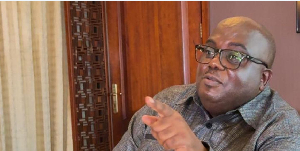Former Attorney General and Minister of Justice, Martin Amidu, has technically destroyed the work of his friend, Ace Anan Ankomah’s Special Prosecutor Bill, which is to enable the Akufo-Addo’s government create a special prosecutor’s office that will deal with various corruption issues in government.
The ex-Attorney General, Martin Amidu nicknamed, “Citizen Vigilante,” who has perused the bill, insists President Akufo-Addo, is being set up to be embarrassed by some faceless persons who clandestinely introduced some clauses into the special prosecutor’s Bill to limit the prosecutor role.
He charged “I was, however, shocked particularly by Clause 3 sub-clause 4 of the Bill which makes the whole Office of the Special Prosecutor Bill, 2017 a waste of public resources and everybody’s time. Clause 3(4) undermines the President’s exemplary rhetoric since his assumption of office to relentlessly fight against all forms of corruption”.
Mr. Amidu suspects “somebody must be sabotaging the President’s fight against corruption. What you will read hereunder relates only to Clause 3 which deals with the functions of the office. It demonstrates what has happened to Presidents who intend the good of their people and nations but were led astray by minders and appointees with clearly different and opposite criminal objectives”.
The bill according to insiders at the Flagstaff House and Attorney General’s Department was contracted to the New Patriotic Party (NPP) lawyer, Ace Anan Ankomah for drafting at an expensive amount by the Akufo-Addo government.
Ace Ankomah, had been one of the advocates for the office of Special Prosecutor using the platform of OccupyGhana, Franklin Cudjoe of IMANI, Sydney Casely–Hayford, George Andah and Yofi Grant, Ken Ofori-Atta, among others against the Mahama government, tagging the administration as corrupt.
Andah, Grant and Ofori-Atta are presently the Deputy Minister of Communication, Chief Executive of Ghana Investment Promotion Center (GIPC) and Finance Minister, respectively.
The Herald is following up on details of the exact amount paid to Ace Ankomah for drafting the Special Prosecutor Bill by the government.
In an article release Tuesday, Mr. Amidu explained that “My purpose of publishing this out of my critique of the Bill as a whole is to alert the public to take a keen interest in the passage of the Bill through Parliament so that Ghanaians are not short-changed in the actualization of the promise by the President to fight corruption as corruption and crime as crime”.
The Bill has since been withdrawn from Parliament by the Majority Leader, Osei Kyei Mensah Bonsu, who has since disclosed that a number of memoranda have been submitted with inputs on how to improve upon the Bill and these suggestions are being considered.
The Bill was withdrawn after a feisty resistance by the Minority in Parliament, who raised issues about breach of procedures in laying the Bill in Parliament.
By Parliamentary procedures, all Bills have to be published and gazetted for a period of 14-days before they are laid before Parliament.
However, the Deputy Attorney General, Mr. Joseph Dindiok Kpemka, laid the Bill on July 19, 2017, under the cover of a certificate of urgency.
When the Bill was sent before the Constitutional, Legal and Parliamentary Affairs Committee, the members made up of both NDC and NPP, rejected the Bill, stating there was no urgency for such a bill.
But Osei Kyei Mensah Bonsu , who is also the Parliamentary Affairs Minister, bluffed in an interview with the Accra-based Joy FM that, the Majority, could easily have gone ahead to pass the Bill, but opted for consensus and broader consultation.
That notwithstanding, he said they would have to finish with the consultations early enough and pass the bill before the 2018 budget is read.
“We certainly are going to pass it. We need to finish early for it to be factored into the ensuing budget because establishing the office will require budgetary allocation and then have them factored into the 2018 budget,” he said.
Mr. Amidu, had argued that “When it became clear to me that we the People might not be allowed our democratic right to participate in the discourse leading to the enactment of the Office of the Special Public Prosecutor Bill, 2017 I raced against time to hurriedly research and write a lengthy constitutional and legal critique of the Bill”.
According to him, the clauses, which were not part of the original bill were introduced by “men and women who might have wormed their way into public office by deceiving the President about their credentials of integrity and honour to render loyal service to him and the Republic of Ghana.”
Martin Amidu said Clause 3(4) which was also not part of the original draft of the Bill, negates the whole promise that the President made during his campaign and after his assumption of office to fight corruption.
It states the Special Prosecutor is not to investigate and prosecute corruption offences relating to the Public Procurement Act, 2003 and the Criminal Offences Act, 1960 “….specified under paragraphs (a), (b) and (c) of subsection (1) unless the commission of the offence is in respect of a vast quantity of assets that (a) constitute a substantial proportion of the resources of the country; (b) threaten the political stability of the country; or (c) threaten the sustainable development of the country.”
In an article copied to citifmonline.com, Martin Amidu, noted that clause was vague and a clear attempt to limit the powers of the special prosecutor.
“The attempt to distinguish the types of corruption offences that may be investigated and prosecuted by the Special Prosecutor sends the clear message to Ghanaians that the President and his Government now accept certain types of corruption offences as not serious for prosecution, or at least to be prosecuted by the Special Prosecutor,” he said.
“I have no doubt that the insertion of Clause 3(4) that negates the whole Bill before Parliament was done to enable those proponents to harvest their shameless perceived share of the proceeds of corruption that dishonest appointees criminally exploit in public office.”
He called on Akufo-Addo to closely monitor some of his perceived incorruptible appointees whom he said may have been responsible for smuggling the clause into the bill.
“..the consequential amendments in Clause 78 (1) also remove the offence of corruption from the jurisdiction of the Economic and Organised Crime Office when it states that: “The Economic and Organised Crime Office Act, 2010 (Act 804) is amended in section 74 by the deletion the words “corruption and bribery” in paragraph (a) of the definition of serious offence,” Martin Amidu said.
“Who then will investigate the species of corruption the Government has removed from the Special Prosecutor’s functions by the insertion in Clause 3(4) of the Bill before Parliament?” he quizzed.
“The retention of sub-clause 4 of Clause 3 of the Bill makes it unnecessary to enact any Office of the Special Prosecutor Bill into law… Bribery and corruption is bribery and corruption. We cannot justify any form of corruption. The 1992 Constitution did not make any exception when it prohibited corruption and enjoined every citizen to fight corruption. The exceptions in Clause 3(4) of the Bill are consequently unconstitutional. Somebody should have known or realized that those insertions would embarrass the President in the promises he made to Ghanaians to fight corruption and prevented their insertion in the Bill,” Martin Amidu concluded.
Below is Martin Amidu’s assessment of the Bill in its current form
THE FUNCTIONS OF THE OFFICE – CLAUSE 3 OF THE BILL
The original draft Bill submitted for discussions at the Stakeholders’ Meeting of 27-28th June 2017 did not include the new Clause 3 (3) and (4). Sub-clause (3) that was added to the Bill before Parliament is with respect unnecessary, it will be a waste of public funds during the gestation period particularly and it is too populist to be enshrined in the law.
Clause 3(4) which was also not part of the original draft of the Bill, negates the whole promise that the President made during his campaign and after his assumption of office to fight corruption, if as it states the Special Prosecutor is not to investigate and prosecute corruption offences relating to the Public Procurement Act, 2003 and the Criminal Offences Act, 1960 “….specified under paragraphs (a), (b) and (c) of subsection (1) unless the commission of the offence is in respect of a vast quantity of assets that (a) constitute a substantial proportion of the resources of the country; (b) threaten the political stability of the country; or (c) threaten the sustainable development of the country.”
First and foremost, sub-clause 4 of Clause 3 of the Bill before Parliament lays down vague and ambiguous exceptions for the purposes of determining which corruption offences will meet those standards for investigations to begin with in the first place.
Secondly, the vagueness and ambiguity of the exceptions made, provide an argument to be overcome by the Special Prosecutor when the objection is raised in Court that his decision to prosecute a corruption offence does not meet the threshold standard stipulated in the Bill.
Thirdly, the attempt to distinguish the types of corruption offences that may be investigated and prosecuted by the Special Prosecutor sends the clear message to Ghanaians that the President and his Government now accept certain types of corruption offences as not serious for prosecution, or at least to be prosecuted by the Special Prosecutor.
Fourth, the question may be asked, who will be responsible for investigating and prosecuting categories of corruption offences by the same public officers and politically exposed persons not meeting the standards in Clause 3(4). Or are they then immune from prosecution for such corruption offences?
And fifth, there is no rational reason for having two types of prosecutors for the same corruption offence when committed by the same public officers. I will return to this in due course to show that the exemption grants immunity to public officers from being prosecuted for committing the exempted corruption offences.
The President has been clear throughout his campaign and on assumption of office that the canker of corruption must be fought and uprooted through a Special Public Prosecutor. He has said time without number that crime is crime and therefore corruption is corruption.
So how come the Bill that was submitted to the Stakeholders’ Meeting on 27-28th June 2017 did not contain this exception, but the exception found its way into the Bill after it apparently returned from the Cabinet to Parliament? The Stakeholders’ Meeting of anti-corruption organizations and civil society, I am reliably informed, did not insert sub-clauses 3 and 4 of Clause 3 now appearing in the Bill before Parliament.
The original draft Bill, after taking into account the suggestions of the stakeholders was approved by the Cabinet. Was it therefore the Cabinet who sought to nullify the fight against corruption by inserting this negation of the purpose of the Bill? Whosoever inserted sub-clause 4 of Clause 3 thought they were being ingenuous as we the foolish people of Ghana will not notice that the definition of “corruption and corruption related offence” ceded to the Special Prosecutor in the interpretation at Clause 77 of the Bill includes all corruption offences without exception or degree of seriousness.
Therefore to exclude a species of corruption offences as they sought to do simply means that there would be no institution responsible for the prosecution of the so-called corruption offences that do not fall under the subclause 4 exception.
It follows that the Cabinet or whosoever inserted the sub-clause is legalizing an undefined species of corruption as not being serious corruption – namely constituting a substantial portion of national resources, threatening the stability of the country, or threatening the sustainable development of the country – to warrant prosecution ever or at all. We are doing no honour to our obligations as a nation under the United Nations Convention against Corruption (UNCAC) and the African Union Convention on Prevention and Combating Corruption (AUC).
The serious reader will notice from the Bill before Parliament that the consequential amendments in Clause 78 (1) also remove the offence of corruption from the jurisdiction of the Economic and Organised Crime Office when it states that: “The Economic and Organised Crime Office Act, 2010 (Act 804) is amended in section 74 by the deletion the words “corruption and bribery” in paragraph (a) of the definition of serious offence.”
Who then will investigate the species of corruption the Government has removed from the Special Prosecutor’s functions by the insertion in Clause 3(4) of the Bill before Parliament? This whole exception is a negation of the President’s fight against all forms of corruption in the body politic by using public office holders and politically exposed persons as an example. Will somebody call the President’s attention to read Clause 3 of the Bill before Parliament and confirm whether he endorsed the exception in sub-clause 4 for submission to Parliament?
The retention of sub-clause 4 of Clause 3 of the Bill makes it unnecessary to enact any Office of the Special Prosecutor Bill into law.
CONCLUSIONS
I have no doubt that the insertion of Clause 3(4) that negates the whole Bill before Parliament was done to enable those proponents to harvest their shameless perceived share of the proceeds of corruption that dishonest appointees criminally exploit in public office.
These may be men and women who might have wormed their way into public office by deceiving the President about their credentials of integrity and honour to render loyal service to him and the Republic of Ghana. The insertion of Clause 3(4) in the Bill should therefore be a wake-up call for the President to watch his incorruptible appointees, because as the saying goes, it is not all that glitters which is gold.
I am of the strong conviction that the attempt to pull a fast one on Ghanaians by the insertion of Clause 3(4) into the Bill to negate the fight against corruption is the work of a strong and powerful cabal within the government because they even succeeded in ensuring that the memorandum to the Bill was silent on this important insertion so that it will not catch the eye of the casual Ghanaian reading public.
Bribery and corruption is bribery and corruption. We cannot justify any form of corruption. The 1992 Constitution did not make any exception when it prohibited corruption and enjoined every citizen to fight corruption. The exceptions in Clause 3(4) of the Bill are consequently unconstitutional. Somebody should have known or realized that those insertions would embarrass the President in the promises he made to Ghanaians to fight corruption and prevented their insertion in the Bill.
General News of Friday, 28 July 2017
Source: theheraldghana.com
Martin Amidu destroys Ace Ankomah’s expensive Special Prosecutor’s Bill
Opinions












